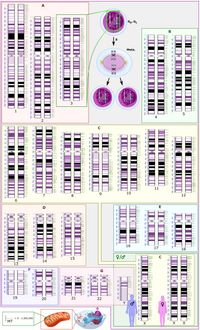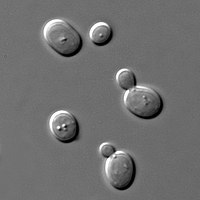
Chromosomal microarray analysis for pregnancies with or without ultrasound abnormalities in women of advanced maternal age
Sign Up to like & getrecommendations! Published in 2019 at "Journal of Clinical Laboratory Analysis"
DOI: 10.1002/jcla.23117
Abstract: Chromosomal microarray analysis (CMA) has been suggested to be routinely conducted for fetuses with ultrasound abnormalities (UA), especially with ultrasound structural anomalies (USA). Whether to routinely offer CMA to women of advanced maternal age (AMA)… read more here.
Keywords: chromosomal microarray; analysis; ultrasound abnormalities; women advanced ... See more keywords

Chromosomal microarray in postnatal diagnosis of congenital anomalies and neurodevelopmental disorders in Serbian patients
Sign Up to like & getrecommendations! Published in 2022 at "Journal of Clinical Laboratory Analysis"
DOI: 10.1002/jcla.24441
Abstract: Array‐based genomic analysis is a gold standard for the detection of copy number variations (CNVs) as an important source of benign as well as pathogenic variations in humans. The introduction of chromosomal microarray (CMA) has… read more here.
Keywords: neurodevelopmental disorders; microarray postnatal; postnatal diagnosis; chromosomal microarray ... See more keywords

Chromosomal microarray analysis in fetuses with an isolated congenital heart defect: A retrospective, nationwide, multicenter study in France
Sign Up to like & getrecommendations! Published in 2019 at "Prenatal Diagnosis"
DOI: 10.1002/pd.5449
Abstract: Congenital heart defects (CHDs) may be isolated or associated with other malformations. The use of chromosome microarray (CMA) can increase the genetic diagnostic yield for CHDs by between 4% and 10%. The objective of this… read more here.
Keywords: heart; chromosomal microarray; study; congenital heart ... See more keywords

Personalized prenatal genomic testing: Couples' experience with choice regarding uncertain and adult‐onset findings from chromosomal‐microarray‐analysis
Sign Up to like & getrecommendations! Published in 2020 at "Prenatal Diagnosis"
DOI: 10.1002/pd.5856
Abstract: Chromosomal‐microarray‐analysis (CMA) can identify variants of uncertain clinical significance, susceptibility‐loci for neurodevelopmental conditions, and risk for adult‐onset conditions. We explored choices made by couples undergoing prenatal CMA, their understanding of these findings, reasons for and… read more here.
Keywords: personalized prenatal; chromosomal microarray; adult onset; microarray analysis ... See more keywords

Disparities in the acceptance of chromosomal microarray at the time of prenatal genetic diagnosis.
Sign Up to like & getrecommendations! Published in 2022 at "Prenatal diagnosis"
DOI: 10.1002/pd.6109
Abstract: OBJECTIVE Chromosomal microarray (CMA) increases the diagnostic yield of prenatal genetic diagnostic testing but is not universally performed. Our objective was to identify provider and patient characteristics associated with the acceptance of CMA at the… read more here.
Keywords: time prenatal; prenatal genetic; cma; chromosomal microarray ... See more keywords

Prenatal diagnosis for fetuses with isolated and non‐isolated congenital heart defects using chromosomal microarray and exome sequencing
Sign Up to like & getrecommendations! Published in 2022 at "Prenatal Diagnosis"
DOI: 10.1002/pd.6168
Abstract: To investigate the use of chromosomal microarray (CMA) and Exome sequencing (ES) in fetuses with congenital heart disease (CHD). read more here.
Keywords: exome sequencing; prenatal diagnosis; chromosomal microarray; congenital heart ... See more keywords

Chromosomal microarray analysis in pregnancy loss: Is it time for a consensus approach?
Sign Up to like & getrecommendations! Published in 2022 at "Prenatal Diagnosis"
DOI: 10.1002/pd.6244
Abstract: To investigate the efficacy and outcomes of chromosomal microarray (CMA) in the cytogenomic evaluation of products of conception (POC). read more here.
Keywords: loss time; analysis pregnancy; microarray analysis; microarray ... See more keywords

Receiving uncertain results from prenatal Chromosomal Microarray Analysis: Women's decisions on continuation or termination of pregnancy.
Sign Up to like & getrecommendations! Published in 2023 at "Prenatal diagnosis"
DOI: 10.1002/pd.6337
Abstract: Chromosomal microarray analysis (CMA) may detect variants of uncertain clinical significance (VUS) and susceptibility loci (SL) with incomplete penetrance for neurodevelopmental disorders. This qualitative study provides empirical data on women's experiences with receiving such findings… read more here.
Keywords: microarray analysis; termination pregnancy; continuation termination; pregnancy ... See more keywords

The effect of polyhydramnios degree on chromosomal microarray results: a retrospective cohort analysis of 742 singleton pregnancies
Sign Up to like & getrecommendations! Published in 2021 at "Archives of Gynecology and Obstetrics"
DOI: 10.1007/s00404-021-05995-y
Abstract: To analyze the risk for clinically significant microarray aberrations in pregnancies with polyhydramnios. Data from all chromosomal microarray analyses (CMA) performed due to polyhydramnios between January 2013 and December 2019 were retrospectively obtained from the… read more here.
Keywords: microarray results; normal ultrasound; microarray; clinically significant ... See more keywords

Should prenatal chromosomal microarray analysis be offered for isolated fetal growth restriction? A French multicenter study.
Sign Up to like & getrecommendations! Published in 2021 at "American journal of obstetrics and gynecology"
DOI: 10.1016/j.ajog.2021.05.035
Abstract: BACKGROUND Chromosomal microarray analysis (CMA) improves the detection of genetic anomalies over standard karyotype and is thus recommended in many prenatal indications. However, evidence is still lacking on the clinical utility of CMA in cases… read more here.
Keywords: chromosomal microarray; karyotype; study; cma ... See more keywords

Clinical utility of chromosomal microarray in establishing clonality and high risk features in patients with Richter transformation.
Sign Up to like & getrecommendations! Published in 2021 at "Cancer genetics"
DOI: 10.1016/j.cancergen.2021.10.003
Abstract: Richter transformation (RT) refers to the development of an aggressive lymphoma in patients with pre-existing chronic lymphocytic leukemia/small lymphocytic lymphoma (CLL/SLL). It carries a poor prognosis secondary to poor response to therapy or rapid disease… read more here.
Keywords: patients richter; chromosomal microarray; transformation; richter transformation ... See more keywords